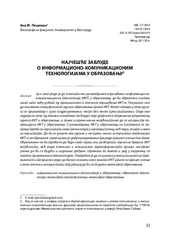Приказ основних података о документу
Najčešće zablude o informaciono-komunikacionim tehnologijama u obrazovanju
Most common misconceptions about informational communication technologies in education
| dc.creator | Pešikan, Ana | |
| dc.date.accessioned | 2021-10-12T12:18:31Z | |
| dc.date.available | 2021-10-12T12:18:31Z | |
| dc.date.issued | 2016 | |
| dc.identifier.issn | 0547-3330 | |
| dc.identifier.uri | http://reff.f.bg.ac.rs/handle/123456789/2146 | |
| dc.description.abstract | Cilj ovog rada je da analitički razmotrimo korišćenje informaciono- komunikacionih tehnologija (IKT) u obrazovanju, da bi obrazovni sistem imao što veću dobit od promišljenog i planskog korišćenja IKT-a. Pokušali smo da pokažemo specifičnost odnosa obrazovanja prema IKT. Mnoge stvari u tom odnosu se prihvataju s puno podrazumevanja, često bez mnogo preispitivanja. Ovde smo izdvojili neka od takvih shvatanja (zabluda) koja doprinose pogrešnom razumevanju odnosa IKT i obrazovanja, a time i ograničenim mogućnostima da se iskoriste potencijali IKT u obrazovanju. U razmatranju IKT u obrazovanju ne postavlja se pitanje treba li koristiti nove tehnologije u nastavi/učenju, već kada, zašto i kako ih koristiti. Da bi se donele ove odluke i na pravi način iskoristio potencijal IKT-a za obrazovne svrhe nužno je dobro razumevanje prirode procesa učenja/nastave. Obrazovanje ne bi trebalo da bude samo kupac ili razboriti korisnik brojnih IKT mogućnosti, već mora pažljivo i osmišljeno transformisati proces nastave/učenja da bi se budući i sadašnji građani spremali za život i rad u okruženju sa znatno promenjenom tehnologijom. Potrebno je da se ciljano uloži još mnogo istraživačkog i teorijskog rada da bismo saznali kako zaista IKT utiče na proces učenja i kako planski iskoristiti taj uticaj da bi se podigao kvalitet obrazovanja. | sr |
| dc.description.abstract | The aim of this paper is to discuss analytically the use of informational communication technologies (ICT) in education so that education system could have greater benefits from its carefully planned use. In this paper we tried to show the specificity of the relations between education and ICT. Many things in that relation are accepted for granted, often without much analyzing. We selected some of typical misconceptions which contribute to erroneous ideas about education and ICT relation resulting in limited opportunities for using up new technologies in education. When analyzing ICT in education there is no room for the question whether to use new technologies in the teaching/ learning process or not, but when, why and how to use them. In order to bring these decisions and use ICT potentials for educational purposes, thorough understanding of the nature of teaching and learning is necessary. Education should not be just a buyer or a prudent user of numerous ICT possibilities but it should carefully and thoughtfully transform the teaching/learning process in order equip future and nowadays citizens with skills necessary for living and working in the environment with significantly changed technology. Much more researching and theoretical work is needed in order to fully understand how ICT really influences the learning process and how to use that influence in order to enhance the quality of education. | en |
| dc.publisher | Pedagoško društvo Srbije, Beograd i Univerzitet u Beogradu - Filozofski fakultet - Institut za pedagogiju i andragogiju, Beograd | |
| dc.relation | info:eu-repo/grantAgreement/MESTD/Basic Research (BR or ON)/179018/RS// | |
| dc.rights | openAccess | |
| dc.rights.uri | https://creativecommons.org/licenses/by-sa/4.0/ | |
| dc.source | Nastava i vaspitanje | |
| dc.subject | obrazovna tehnologija | sr |
| dc.subject | kvalitet obrazovanja | sr |
| dc.subject | kvalitet nastave/učenja | sr |
| dc.subject | informaciono-komunikacione tehnologije u obrazovanju | sr |
| dc.subject | teaching/learning quality | en |
| dc.subject | quality of education | en |
| dc.subject | informational communication technologies in education | en |
| dc.subject | educational technologies | en |
| dc.title | Najčešće zablude o informaciono-komunikacionim tehnologijama u obrazovanju | sr |
| dc.title | Most common misconceptions about informational communication technologies in education | en |
| dc.type | article | |
| dc.rights.license | BY-SA | |
| dc.citation.epage | 46 | |
| dc.citation.issue | 1 | |
| dc.citation.other | 65(1): 31-46 | |
| dc.citation.rank | M24 | |
| dc.citation.spage | 31 | |
| dc.citation.volume | 65 | |
| dc.identifier.doi | 10.5937/nasvas1601031P | |
| dc.identifier.fulltext | http://reff.f.bg.ac.rs/bitstream/id/929/2143.pdf | |
| dc.type.version | publishedVersion |

